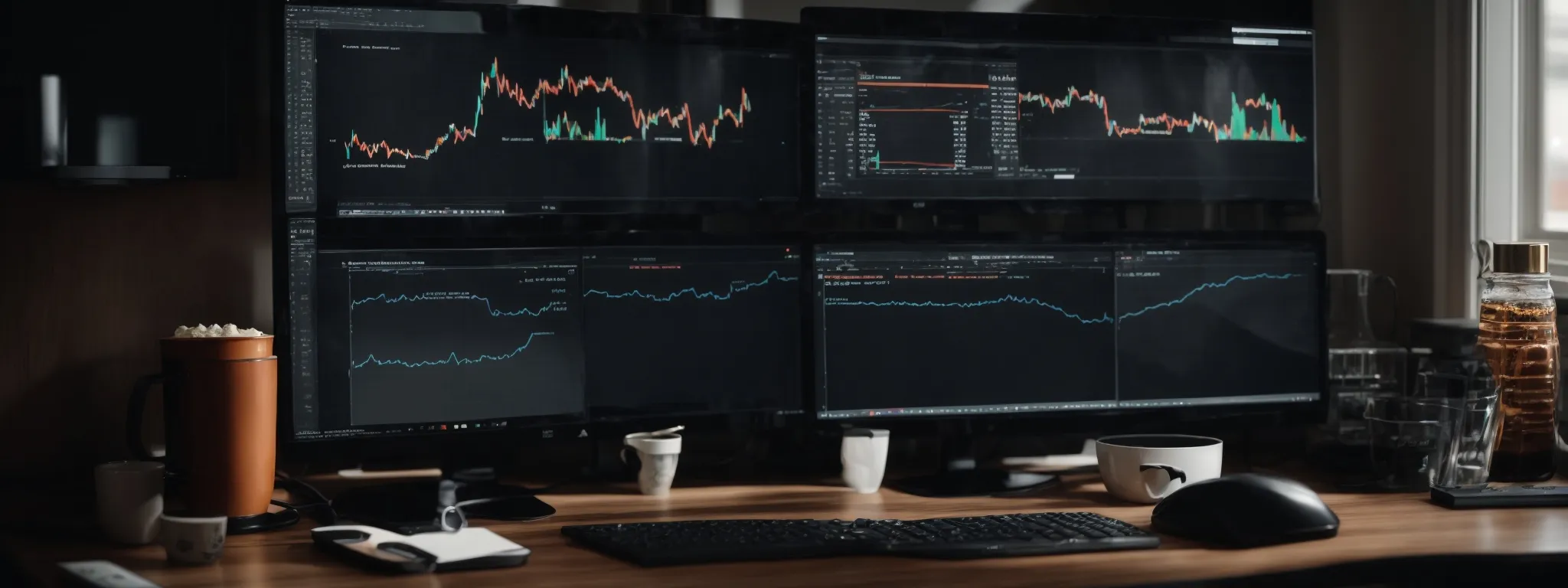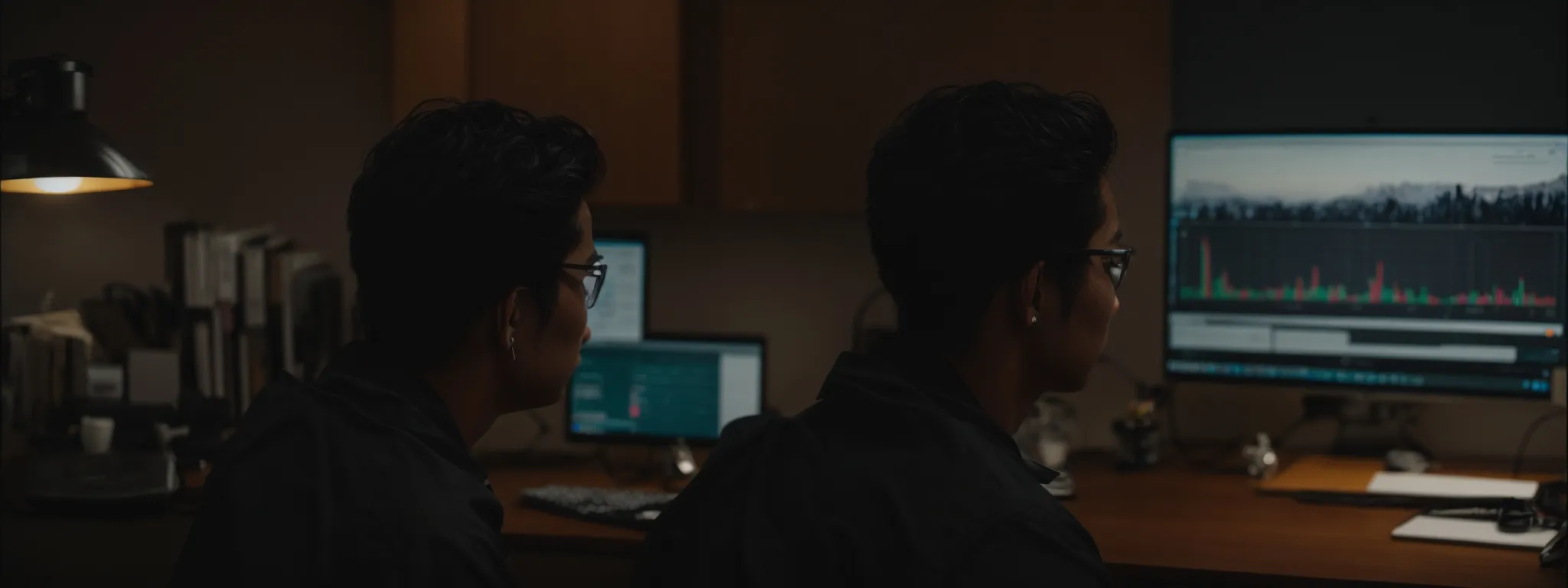Cracking the Code: Technical SEO Interviews
Mastering Technical SEO Interviews: Cracking the Code to Your Dream Job Securing a role as a technical SEO specialist hinges upon a candidate’s ability to navigate the […]
Mastering Technical SEO Interviews: Cracking the Code to Your Dream Job
Securing a role as a technical SEO specialist hinges upon a candidate’s ability to navigate the complex terrain of a job interview with poise and advanced knowledge.
As the demand for skilled SEO practitioners soars, mastering the nuances of technical SEO interviews becomes an imperative stepping stone to elevate one’s career.
From grasping the multifaceted layers of on-page optimizations and backlink strategies to wielding an arsenal of industry-standard tools, the path to impressing potential employers is both an art and a science.
Success lies in the subtle blend of showcasing quantifiable achievements and exuding confidence rooted in up-to-the-minute SEO proficiency.
Keep reading to unlock the secrets to acing your next technical SEO interview like a seasoned expert.
Key Takeaways
- Technical SEO Interviews Assess Depth of Expertise in Specialized Areas Like Site Architecture and Search Engine Algorithms
- Effective Preparation for Technical SEO Interviews Includes Scenario-Based Problem Solving and Mastering Relevant Software Tools
- Demonstrating the Ability to Translate Complex SEO Concepts Into Clear Terms Is Crucial for Communication Within the Field
- Showcasing Impactful SEO Campaigns With Data-Driven Results Is Essential to Prove One’s Efficacy in Real-World Scenarios
- Post-Interview Follow-Ups Are Important for Reinforcing a Candidate’s Interest and Professionalism to Potential Employers
Understanding the Technical SEO Interview Landscape

Entering the sphere of Technical SEO requires meticulous preparation and a clear comprehension of the job interview process.
Candidates aiming to secure their place in this competitive field must grasp the subtleties that distinguish a Technical SEO specialist from other SEO practitioners.
They must prepare to present a compelling case for their in-depth SEO knowledge, showcasing their familiarity with crawler behavior, site architecture, and the importance of page speed in today’s digital landscape.
Understanding the different levels of technical roles, from entry-level positions to seasoned expert seats, directs candidates towards a tailored study plan, essential for success.
Furthermore, anticipating the common formats and questions of technical interviews equips aspirants with the foresight to navigate through these professional milestones.
Preparing for a technical SEO interview differs significantly from the general SEO interviews, with a higher expectation for precision, practical knowledge, and the ability to engage with technical seo interview questions efficiently.
It is this level of preparedness that transforms a challenging interview into a promising entryway to one’s dream job.
Recognize the Different Levels of Technical SEO Roles
The pathway to becoming a Technical SEO specialist begins with acknowledging the hierarchy that exists within the field. Entry-level roles often involve tasks related to site audits and basic analytics, while senior positions require a strategic vision and leadership skills to drive SEO projects.
As one ascends the technical SEO ladder, the complexity of responsibilities increases. From executing on-page optimizations to developing SEO strategies that align with business objectives, understanding the scope of each role is critical:
| Level | Position | Core Responsibilities | Required Skills |
|---|---|---|---|
| Entry-Level | SEO Analyst | Site audits, keyword research, reporting | Analytical thinking, basic SEO tools proficiency |
| Mid-Level | SEO Specialist | On-page optimizations, content strategy, link building | Detailed SEO knowledge, project management |
| Senior-Level | SEO Manager/Strategist | SEO strategy development, team leadership, business integration | Strategic planning, advanced SEO tool mastery |
The Importance of Tailoring Your Study Plan
For individuals intent on forging a path as Technical SEO specialists, Crafting a Unique Study Plan is indispensable. It hinges on the precise technical nuances of search engine optimization, where one size does not fit all, and the importance of personalizing learning to the specific skills and knowledge gaps of the candidate.
Diligent preparation for a technical SEO interview demands a strategy that encompasses a broad spectrum of SEO disciplines, yet hones in on the depth of technical topics such as XML sitemaps, server response codes, and structured data. Outlining a study plan that aligns with the technical complexities of the desired SEO role ensures the candidate stands out in an interview setting:
| Focus Area | Study Topics | Relevance to Role |
|---|---|---|
| Technical Fundamentals | HTML/CSS, JavaScript, HTTP status codes | Crucial for diagnosing content issues and enhancing site speed |
| SEO Tools Mastery | Google Search Console, SEO auditing software | Enables in-depth analysis and insight into search engine rankings |
| Strategy & Analytics | Keyword trend analysis, competitor benchmarking | Forms the basis of data-driven SEO strategies and decision-making |
Common Interview Formats and What to Expect
Technical SEO interviews typically follow a structured pattern, where candidates are presented with a blend of theoretical and practical inquiries. Employers aim to gauge aptitude in technical fundamentals, from site crawling to schema implementation.
The practical component often includes real-world scenarios requiring candidates to diagnose technical faults or optimize website elements. Assessments can range from on-the-spot tasks to take-home challenges that mimic actual SEO responsibilities:
| Interview Stage | Description | Objective | Example Task |
|---|---|---|---|
| Theoretical Assessment | Questions that cover SEO knowledge and concepts | To evaluate the candidate’s understanding of technical SEO principles | Explaining how a crawler interacts with a sitemap |
| Practical Assessment | Auditing tasks or simulations of SEO work | To measure the ability to apply knowledge to tangible SEO tasks | Identifying issues in a given XML sitemap |
How Technical SEO Interviews Differ From Other SEO Interviews
Technical SEO interviews diverge from their traditional SEO counterparts by emphasizing a deep dive into the mechanics of search engines and the technical elements that influence website performance. Unlike broader SEO discussions, these interviews demand clear evidence of expertise in areas like site architecture, server optimization, and the intricacies of search engine algorithms, challenging candidates to prove their capacity for specialized work that directly impacts search rankings.
In comparison, general SEO interviews may touch upon content marketing, link building strategies, and keyword optimization, but technical interviews are distinct in their focus on a candidate’s ability to scrutinize and enhance the technical foundation of a website. This often involves a granular assessment of understanding related to indexation issues, render-blocking resources, and mobile-first considerations, reiterating the specialized nature of the technical SEO role.
Key Concepts You Must Know for Technical SEO Interviews

As the digital landscape continuously evolves, mastering technical SEO has become a pivotal skill for those who desire to scale the ranks in search engine optimization.
At the heart of a successful SEO career lies the technical interview – a challenging arena where candidates must demonstrate fluency in the core concepts that drive today’s search engine algorithms.
From recognizing the shift towards mobile-first indexing to implementing structured data with precision, and understanding how site speed intertwines with modern SEO strategies, candidates must exhibit a robust command of these elements to navigate through the rigorous dialogue of a technical interview.
This introduction underscores the indispensable topics any candidate must be adept in to Articulate Their Capacity as a True Technical SEO Practitioner.
The Pillars of Technical SEO You Can’t Overlook
The essentials of Technical SEO form the bedrock on which digital properties thrive in the competitive ecosystem of search engines. Understanding the fundamental pillars, such as indexation, which ensures pages are consumed and stored by search engines, and accessibility, which allows search engines to reach and evaluate the content, is critical for anyone aspiring to excel in Technical SEO roles.
Candidates must also focus on the technical aspects of SEO that influence user experience, such as site speed and mobile-friendliness: these elements are not just about offering a smooth visit for users, but also about satisfying the performance metrics that search engines prioritize. Mastery over these pillars showcases a candidate’s readiness to address core components impacting a website’s online prominence:
| Pillar | Description | Impact on SEO |
|---|---|---|
| Indexation | Process by which search engines store and organize content. | Essential for pages to appear in search results. |
| Accessibility | The ability of search engines to discover and interpret web content. | Directly affects the crawling and ranking of a site. |
| Site Speed | The load time of web pages on a site. | Influences user experience and search engine ranking factors. |
| Mobile-Friendliness | The optimization of a website for mobile users. | Critical for reaching a wider audience and adhering to mobile-first indexing standards. |
Mobile-First Indexing and Its Impact on SEO
Mobile-first indexing represents a paradigm shift in how search engines prioritize content crawling and ranking. It places the mobile version of a website at the forefront of indexing practices, ensuring that the burgeoning majority of users on mobile devices find content that is accessible and optimized for their platforms.
This transition underscores the significance of responsive web design and the necessity for technical SEO specialists to adapt strategies accordingly. Websites not optimized for mobile viewing risk diminished visibility in search engine results, emphasizing the influence of mobile-first indexing on a brand’s digital success.
Structured Data and Schema Markup Essentials
In the realm of technical SEO interviews, demonstrating knowledge of structured data and schema markup is tantamount to illustrating one’s attention to detail and commitment to enhancing search visibility. Structured Data Lays the Groundwork for search engines to not only crawl but to deeply understand content, paving the way for enriched search results and heightened user engagement:
- Structured data implementation involves applying a standardized format to annotate elements within a web page, making it unequivocally clear to search engines what type of information is presented.
- Schema markup, a particular vocabulary of structured data, helps define and categorize content, empowering search engines to display more informative results like rich snippets, which can significantly increase click-through rates.
- To excel in a technical SEO role, proficiency in this domain is crucial, as it directly influences how content is interpreted and valued by search engines, thereby affecting the overall search performance of a website.
Being adept at schema markup makes a candidate a valuable asset in any SEO team, as it goes beyond basic meta tags and delves into tagging specific details like reviews, events, and products, which are integral to modern SEO strategies. Mastery in this area endorses a candidate’s ability to elevate a website’s presentation in the SERPs, directly impacting click-through rates and user experience.
The Role of Site Speed in Today’s SEO Strategies
The landscape of search engine optimization acknowledges site speed as a pivotal factor, correlating directly with user satisfaction and retention. As search engines refine their algorithms, they place an unprecedented emphasis on the user experience, where quick load times serve as a cardinal metric, impacting a website’s search engine rankings and visibility.
Professionals adept in technical SEO understand the multifaceted role site speed plays, from influencing bounce rates to affecting conversion metrics. They recognize that optimizing a website’s speed is not merely a technical challenge but a strategic imperative, vital for carving out a competitive edge in the digital marketplace.
Dive Deep Into on-Page and Off-Page Optimization Strategies

In an intricate tapestry of search engine optimization, the threads of on-page and off-page strategies weave together to form the robust framework essential for ascending the SERP ranks.
For professional SEO candidates, mastery in these domains is not an option but a requirement.
Optimizing on-page elements extends beyond mere keyword insertion to encompass a refined understanding of user engagement and content relevance, while off-page optimization demands shrewd acumen in securing authoritative backlinks and fortifying a brand’s digital footprint.
Acknowledging a holistic SEO approach proves indispensable, allowing for agility amidst the ever-evolving search engine algorithms.
Technical SEO interviews probe deep into these competencies, challenging applicants to demonstrate sophisticated proficiency in harmonizing these facets effectively within their SEO strategies.
Optimizing Your on-Page Elements for Search Engines
On-page optimization is a fundamental component of SEO where professionals ensure that web elements like title tags, content, and images are strategically leveraged to boost a site’s visibility. A technical SEO specialist must exhibit a nuanced ability to meld these elements so they not only resonate with user intent but also adhere to search engine guidelines for maximum effectiveness.
An SEO expert delves into the structural aspects of on-page optimization, recognizing the role of streamlined HTML and the strategic placement of keywords within content to enhance relevance. They discern the subtle yet critical significance of factors such as meta descriptions and header tags in communicating the essence of web pages to search engine crawlers.
Leveraging Off-Page Optimization for Greater Visibility
Off-page optimization stands as a testament to a website’s authority and credibility in the vast digital landscape. It is the practice of bolstering a site’s stature through external means, chiefly through the acquisition of quality backlinks from reputable sources that signal trust to search engines and users alike.
Cultivating these external relationships through strategic outreach and network strengthening allows a technical SEO specialist to project a site’s influence beyond its immediate sphere, thus amplifying visibility and reinforcing search engine confidence in the site’s content validity and worth.
The Importance of a Holistic SEO Approach
Embracing a holistic SEO approach is imperative for Technical SEO specialists who aim to secure a competitive advantage in today’s search-savvy market. This comprehensive methodology not only encapsulates the refinement of on-page elements and off-page strategies but also emphasizes the seamless integration of technical optimizations that directly impact search engine algorithms and user experience.
Adept professionals recognize that a holistic SEO strategy fosters a symbiotic relationship between various optimization facets, from content creation to link building. This unified tactic ensures that each element reinforces the others, creating a well-rounded and effective SEO campaign that is greater than the sum of its parts.
Understanding Search Engine Algorithms and Updates
Grasping the intricacies of search engine algorithms is a task that demands vigilance and continuous learning. As search engines like Google constantly evolve with updates ranging from core algorithm shifts to nuanced changes in ranking factors, a technical SEO specialist must stay abreast of these developments to ensure strategies remain effective and compliant:
| Algorithm Update | Purpose | Impact on SEO |
|---|---|---|
| Core Updates | To refine search results and improve relevance. | Requires comprehensive review and adjustments in SEO tactics. |
| Page Experience Update | To prioritize user experience factors in rankings. | Emphasizes the need for site speed and mobile-friendliness optimization. |
| Mobile-First Indexing | To better serve the growing mobile user base. | Shifts focus to mobile-optimized content and design for higher visibility. |
With updates often cloaked in technical jargon and their implications spread over multifarious SEO areas, the adept candidate transforms these updates into actionable insights. It is their proficiency in dissecting algorithmic changes and integrating them into a broader SEO strategy that ensures sustained success and adaptability in the digital realm.
Critical Tools for Any Technical SEO Expert’s Arsenal

To navigate the intricate maze of technical SEO interviews, armament with powerful tools and software is paramount for those seeking to demonstrate their expertise in this specialized field.
Drawing on an Extensive Array of Analytics and data interpretation skills, candidates must illustrate their adeptness at employing industry-standard software like Google Analytics to glean actionable insights.
Furthermore, Proficiency in Crawling and Site Auditing Tools, such as Screaming Frog, proves indispensable for identifying technical issues that could impede a website’s performance.
Mastery over various content management systems also stands crucial in implementing SEO efficiently, allowing technical SEO experts to optimize content and structure with precision.
This suite of tools forms the technical backbone for aspirants, equipping them to articulate their worth and technical prowess in the high-stakes arena of SEO interviews.
Mastering the Use of Essential SEO Software
For technical SEO experts, proficiency with SEO software is not just about analytics; it’s about Leveraging These Tools to Craft Persuasive Narratives from data and insights. Mastery in SEO software, especially platforms like LinkGraph’s SearchAtlas, empowers these specialists to dissect and interpret vast datasets, transforming them into strategic decisions that drive SEO success.
Navigating the complex digital environment with adeptness in essential SEO Software Such as SearchAtlas allows technical SEO experts to fine-tune their approach to optimization. By harnessing the full capabilities of these tools, professionals can perform exhaustive site audits, present compelling SEO reporting strategies, and ultimately establish a powerful online presence aligned with algorithmic demands.
How to Showcase Proficiency in Analytics and Data Interpretation
Demonstrating expertise in analytics and data interpretation begins with articulating one’s ability to extract meaningful patterns and insights from complex datasets. A candidate showcases an advanced level of understanding by presenting how these analytics can directly inform and influence SEO strategies, driving quantifiable improvements in search engine rankings and user engagement.
It’s essential for technical SEO interviewees to communicate their familiarity with evaluating key performance indicators and translating this data into actionable recommendations for optimization. Professionals can convey their analytical prowess by discussing their success in utilizing metrics to refine SEO campaigns and enhance overall web performance, thereby establishing their role as data-driven decision-makers in the SEO landscape.
Skills in Crawling and Auditing Tools Like Screaming Frog
Proficiency in using crawling and auditing tools such as Screaming Frog positions a candidate at the forefront of technical SEO expertise. These Tools Provide an Immersive Platform for dissecting a website’s architecture, analyzing metadata, and uncovering technical issues that may elude a less equipped eye.
An adept professional uses Screaming Frog to conduct comprehensive audits, parsing through thousands of URLs swiftly to identify redirects, errors, and duplicate content issues, which are pivotal for augmenting a site’s search engine performance. Mastery of such tools demonstrates a candidate’s capability to optimize a website’s technical SEO foundation, an essential skill highly sought-after by prospective employers.
Utilizing Content Management Systems for SEO Efficiency
Command Over Content Management Systems (CMS) is a non-negotiable skill for technical SEO experts striving for efficiency and agility in optimization practices. The CMS serves as the groundwork in which on-page elements are orchestrated, ensuring that SEO efforts are not only precise but also scalable within the dynamic content demands of modern web presences.
Technical SEO specialists leverage the inherent capabilities of CMS platforms to streamline workflow and bolster search engine visibility. Through these systems, they adeptly apply SEO best practices—from structuring URLs to optimizing image attributes—in a manner that maintains the delicate balance between user experience and search engine requirements.
Preparing for Common Technical SEO Interview Questions

In the quest for the coveted role of a Technical SEO specialist, the interview stage stands as one of the most critical junctures, a veritable gateway to that dream position where expertise meets opportunity.
Mastering an interview in this specialized field entails not just a display of technical prowess but the eloquent articulation of one’s experiences and adeptness in handling real-world situations.
The forthcoming discussions will lend insights into how a candidate might navigate scenario-based inquiries, recount the strategic impact of past projects, anticipate the rigor of practical assessments, and convey intricate technical concepts in terms digestible to those not versed in the vernacular of SEO.
The path to acing such interviews is marked by the clarity of explanation, the confidence of experience, and the ability to demonstrate profound technical insight—attributes that set apart formidable candidates in the eyes of future employers.
How to Answer Scenario-Based Technical Questions
When approaching scenario-based technical questions during a Technical SEO interview, candidates should display their proficiency in applying theoretical knowledge to practical situations. It is essential to address these questions with a methodical breakdown of the issue, outlining step-by-step the analytical process and decision-making rationale used to arrive at a solution.
Effective communication in detailing how they would navigate specific SEO challenges showcases a candidate’s strategic thinking and problem-solving skills. This often entails tapping into their experience, bringing forward relevant examples that highlight their expertise in transforming SEO hurdles into opportunities for optimization and growth:
| Scenario | Problem Presented | SEO Aspects Involved | Approach to Resolution |
|---|---|---|---|
| Website Redesign | How to maintain SEO equity during a site overhaul. | URL Structure, Redirects, On-Page Elements | Detailing a transition plan that includes meticulous mapping of redirects and preservation of on-page SEO. |
| Declining Organic Traffic | Identifying reasons behind a drop in user visits. | Analytics Review, Algorithm Updates, Technical Errors | Conducting a comprehensive audit to pin down technical flaws or algorithmic penalties, followed by a corrective action strategy. |
Discussing Past Projects and Your Role in Them
In navigating the landscape of technical SEO interviews, professionals are often tasked with recounting their involvement in past projects. It’s incumbent upon the candidate to effectively communicate the precise role they played, emphasizing outcomes and how their actions aligned with, or evolved, overarching SEO strategies.
Detail-oriented yet concise articulation of project contributions affirms a candidate’s proficiency and experiential depth. Describing their direct impact on achieving benchmarks, such as enhancing site ranking or improving organic traffic, provides tangible proof of a candidate’s efficacy in real-world SEO scenarios.
Practical Exercises and Test Projects: What to Expect
Practical exercises and projects are a common component of the technical SEO interview process, designed to assess a candidate’s hands-on skills. Expect scenarios where real-time problem-solving is essential: these tasks range from identifying crawl errors to recommending optimizations for a sample page’s meta-data.
The tendency to scrutinize prowess in technical implementation becomes apparent through these exercises. Candidates may find themselves devising a strategy for a hypothetical site migration or conducting an On-the-Fly Audit Using Tools Like Screaming Frog or SearchAtlas:
| Exercise Type | Purpose | Key Focus |
|---|---|---|
| Site Migration Strategy | To evaluate planning and execution of extensive changes. | Maintaining SEO equity, redirect mapping, avoiding traffic loss. |
| On-the-Fly Audit | Assessing technical skill in identifying and resolving issues. | Link integrity, meta-data evaluation, HTML structure analysis. |
Moreover, these Real-World Challenges Aid Employers in discerning a candidate’s ability to apply theoretical knowledge effectively under technical constraints and pressure. The exercises serve to corroborate the practical expertise that successful candidates must wield in today’s dynamic SEO domain.
Communicating Complex Technical Concepts to Non-Experts
Distilling the essence of technical SEO into straightforward terms is a critical skill for candidates, particularly when interfacing with clients or team members who may not possess a deep-seated understanding of SEO. It is the ability to translate the complexities of search algorithms, indexing, and the nuances of page optimization techniques into coherent and relatable language that marks a candidate’s communicative mastery.
Demonstrating this during an interview, a technical SEO specialist must navigate the delicate balance of maintaining technical accuracy while ensuring clarity and comprehension. Articulating the rationale behind strategies and distilling the impact of intricate SEO actions into tangible business insights is a prized capability, reflecting an individual’s suitability for roles that demand an intersection of expert knowledge and effective communication.
Showcasing Your SEO Success Stories and Case Studies

In the rigorous domain of technical SEO interviews, the strength of a candidate’s portfolio often tips the scales in their favor.
Highlighting notable SEO campaigns serves as persuasive evidence of their expertise.
The discernment shown in selecting which projects to showcase underscores an SEO professional’s evaluative skills.
Moreover, fortifying these narratives with data-driven results, demonstrated through metrics and KPIs, offers incontrovertible proof of their strategic acumen.
Seasoned experts know that recounting the obstacles encountered—and the innovative tactics employed to overcome them—paints a portrait of a resilient and adaptive thinker, traits indispensable for a career in the complex and ever-changing landscape of search engine optimization.
Selecting Your Best SEO Campaigns for Discussion
When a professional embarks on the journey to demonstrate their prowess in technical SEO interviews, the selection of their most impactful SEO campaigns for discussion holds great significance. This process involves a strategic choice, focusing on campaigns that highlight a comprehensive understanding of SEO dynamics, alignment with client objectives, and remarkable results that have advanced a brand’s digital presence.
The gravity of these success stories is amplified when they are buttressed by data that vividly illustrates the candidate’s command over SEO strategies and their direct contribution to measurable outcomes. Such selective emphasis not only conveys the depth of a candidate’s experience but also their ability to drive substantial growth in organic search metrics, painting a compelling picture of their SEO proficiency.
| Campaign | Objective | SEO Strategies Used | Outcomes |
|---|---|---|---|
| Brand A Website Revamp | Increase organic visibility and user engagement post-redesign | Comprehensive keyword research, on-page optimizations, technical audits | Surge in page views by 120%, reduction in bounce rate by 25% |
| E-commerce B Link Building Initiative | Establish domain authority in competitive niche | Curated white label link-building, influencer collaborations | 30% uplift in domain authority, 50% increase in organic traffic |
Quantifying Your Successes With Metrics and KPIs
In the technical SEO interview, the acute importance of backing up success stories with measurable results cannot be overstated. Professional candidates differentiate themselves by presenting a clear linkage between the SEO strategies employed and the resultant performance metrics, such as increased organic traffic, improved conversion rates, and enhanced search visibility.
Through the strategic articulation of key performance indicators, or KPIs, candidates substantiate the efficacy of their SEO campaigns, delineating the direct impact of their efforts on a client’s business objectives:
- Illustrating an upward trajectory in organic search rankings directly attributed to meticulous SEO campaign management.
- Demonstrating a substantial growth in leads and conversions as a result of refined content and keyword strategies.
- Highlighting a decrease in page load times subsequent to technical optimizations, leading to improved user engagement.
Comprehensive data-points bring to life the intricate tapestry of SEO initiatives undertaken by the specialist, offering concrete evidence of their role in steering digital strategies towards tangible business gains. This numerical narration of successes not only underscores the proficiency of the candidate but also serves to fortify their position as results-driven technical SEO experts.
Lessons Learned: Sharing Challenges and How You Overcame Them
In any technical SEO interview, candidates are expected to not only recount their triumphs but also the impediments they faced and the ingenuity with which they navigated these challenges. Admitting to difficulties encountered demonstrates candor and a willingness to learn, while elucidating the remedies applied signifies resourcefulness, a trait highly acclaimed in the SEO field.
Professionals who candidly share the lessons learned through overcoming obstacles confer a narrative of growth and adaptability. This transparency reveals a professional’s capability to evolve strategies in response to the dynamic nature of search engine algorithms and industry standards, cementing their reputation as resilient technical SEO experts.
Staying Updated on SEO Trends and Best Practices

To ascend the ranks of the Technical SEO profession and secure a coveted position, an unyielding commitment to staying informed on the latest trends and best practices is imperative.
Professionals who vigilantly source the latest SEO news and invest in continuous education position themselves at the forefront of industry advancements.
Networking within the SEO community and leveraging personal projects are savvy maneuvers that not only keep skills razor-sharp but also demonstrate a candidate’s ongoing engagement with the ever-evolving SEO landscape.
Adept experts understand that this commitment to learning and community involvement is at the heart of any successful SEO career—crucial in preparing for the detailed probing and advanced expectations characteristic of technical SEO interviews.
Sourcing Reliable SEO News and Continuing Education
For professionals vying for a top-tier position in the realm of Technical SEO, the pulse of the industry is found within the pages of reliable SEO news sources and through continued education programs. As the digital landscape swiftly evolves, staying conversant with Google’s updates, emerging technologies, and algorithm changes is non-negotiable for any aspirant.
Investing time in accredited SEO courses, certifications, and attending webinars led by seasoned professionals bolsters a candidate’s expertise and demonstrates commitment to their craft. It is through this perpetual learning and skill enhancement that an individual can maintain a cutting-edge SEO knowledge base and navigate the competitive terrain of technical interviews with confidence:
| Resource Type | Details | Benefits |
|---|---|---|
| SEO News Outlets | Platforms offering the latest updates and insights in SEO. | Equips candidates with current trends and algorithm intel. |
| Educational Programs | Courses and certifications from reputable institutions. | Provides in-depth knowledge and validates SEO expertise. |
| Industry Webinars | Online sessions hosted by experts in the field. | Offers practical insights and networking opportunities. |
The Importance of Community and Networking in SEO
Within the vibrant ecosystem of search engine optimization, community engagement and networking emerge as keystones for professionals. Active participation in forums, discussions, and SEO events fosters a wealth of collaborative wisdom and shared experiences, enriching one’s own SEO practices and nurturing professional growth.
Nurturing relationships with industry peers through networking not only accelerates the exchange of innovative SEO strategies but also opens doors to mentorship opportunities and potential collaborations. Such interactions are invaluable for professionals aiming to remain at the cusp of SEO advancements and to showcase a well-rounded, community-informed knowledge base in technical SEO interviews.
Leveraging Personal Projects to Demonstrate Current Skills
Leveraging personal projects offers technical SEO professionals a tangible means to exhibit their current skills and innovative approaches. These ventures serve as a dynamic portfolio, demonstrating the pragmatic application of SEO strategies and the continual refinement of techniques essential for staying ahead in the industry.
Personal projects allow an individual to experiment with cutting-edge SEO tactics, showcasing their ability to adapt methodologies in response to algorithmic trends and market demands. By presenting these projects during technical SEO interviews, candidates highlight not only their technical acumen but also their commitment to practical, results-driven SEO work:
- Illustrating problem-solving skills through case studies of personal projects with measurable outcomes.
- Demonstrating mastery over latest best practices by detailing the successes achieved in these independent initiatives.
- Highlighting the adept use of contemporary SEO tools and techniques within their own digital properties.
Nailing the Interview With Confidence and Expertise

The journey to securing a groundbreaking role as a Technical SEO specialist culminates with the interview—a pivotal moment where expertise, confidence, and strategic questions coalesce to forge an unforgettable impression.
In this arena, candidates must not only demonstrate their technical knowledge with finesse but also engage the interviewer, transforming the dialogue into an opportunity to uncover deeper insights about the position and the employer’s objectives.
This phase demands that applicants exude confidence, even when navigating complex questions, and understand the critical nature of the interview’s aftermath.
The actions following the interview are as important as the performance during it, setting up the course for potential engagement and solidifying the applicant’s professional standing.
Creating a Lasting Impression With Your Technical Knowledge
Demonstrating a deep reservoir of technical SEO knowledge during an interview not only validates a candidate’s expertise but also imprints a memorable distinction upon the interviewers. Mastery in discussing complex algorithms, site structure, and analytical insights with clarity and precision positions the candidate as a notable contender, leaving an enduring mark of competence and professionalism.
When a candidate articulates nuanced SEO strategies and their Successful Application in Past Projects with confidence, it resonates with potential employers as a testimony of their capability. This adept conveyance of technical prowess, coupled with real-world results, crafts an impressive narrative that can solidify their candidacy as the optimum choice for the technical SEO position.
Questions You Should Ask Your Interviewer
During a technical SEO interview, it is critical for candidates to pose informed questions that not only demonstrate their understanding of the role but also their strategic thinking. By inquiring about the company’s SEO tools and methodologies, an applicant shows genuine interest in the company’s practices while also assessing if the company’s technological environment complements their own skillset.
It behooves the candidate to inquire about the team dynamics and the company’s expectations for the technical SEO role, as this offers insight into how the organization values and integrates SEO within its overall marketing strategy. Such questions underline a candidate’s foresight and their potential for contributing to the long-term SEO success of the company.
Tips for Projecting Confidence Even on Tough Questions
Projecting confidence in the face of tough questions during technical SEO interviews is about displaying a calm and collected demeanor, regardless of the query’s complexity. Candidates benefit from taking a brief moment to compose their thoughts before responding, ensuring that their answers are well-constructed and convey a deep understanding of technical SEO principles.
Even when presented with questions that challenge their knowledge base, successful candidates communicate their responses with a level of certainty that reinforces their expertise. They recognize that conveying a sense of assurance about their abilities, informed by a solid foundation in SEO techniques and experiences, underlines their capabilities and readiness for the role.
Handling the Follow-Up: Next Steps After the Interview
Mastering the post-interview phase is as vital as the preparation leading up to the meeting with potential employers. The follow-up is an opportunity to reiterate interest in the technical SEO role and to establish a line of communication that may prove crucial in decision-making processes.
The strategic steps taken after an interview can define the trajectory of a candidate’s opportunity for employment:
- Timely follow-up with a thank-you email reinforces professionalism and expresses gratitude for the opportunity to interview.
- Restatement of one’s enthusiasm for the role and the unique contributions one can make should be succinctly encapsulated in the communication.
- It is prudent to inquire about the timeline for hiring decisions, demonstrating respect for the employer’s process while subtly keeping the candidate’s name at the forefront.
Each action serves as a touchpoint, demonstrating persistence without overstepping boundaries, enabling candidates to maintain visibility as employers arrive at their final decision.
Conclusion
Mastering the intricacies of technical SEO interviews is a decisive step towards landing your dream job in this competitive field.
Success hinges on deep understanding and effective articulation of comprehensive SEO knowledge, from site structure and speed optimization to algorithm updates and mobile-first indexing.
Candidates must exhibit proficiency with essential tools like Google Analytics and Screaming Frog, as well as a firm grasp of on-page and off-page optimization strategies.
A well-tailored study plan and an understanding of common interview formats lay the groundwork for effective preparation.
During interviews, it’s crucial to present confidence and expertise, especially when handling scenario-based questions or discussing past projects and successes quantified by metrics.
Asking strategic questions and effectively communicating complex technical subjects also strengthen a candidate’s position.
Post-interview follow-ups are as crucial as the interview performance itself, setting up a professional image and continuing engagement with potential employers.
In an ever-evolving landscape, an unrelenting commitment to staying updated on SEO trends solidifies a candidate’s capability to not just keep pace with, but excel in the dynamic world of search engine optimization.














































































